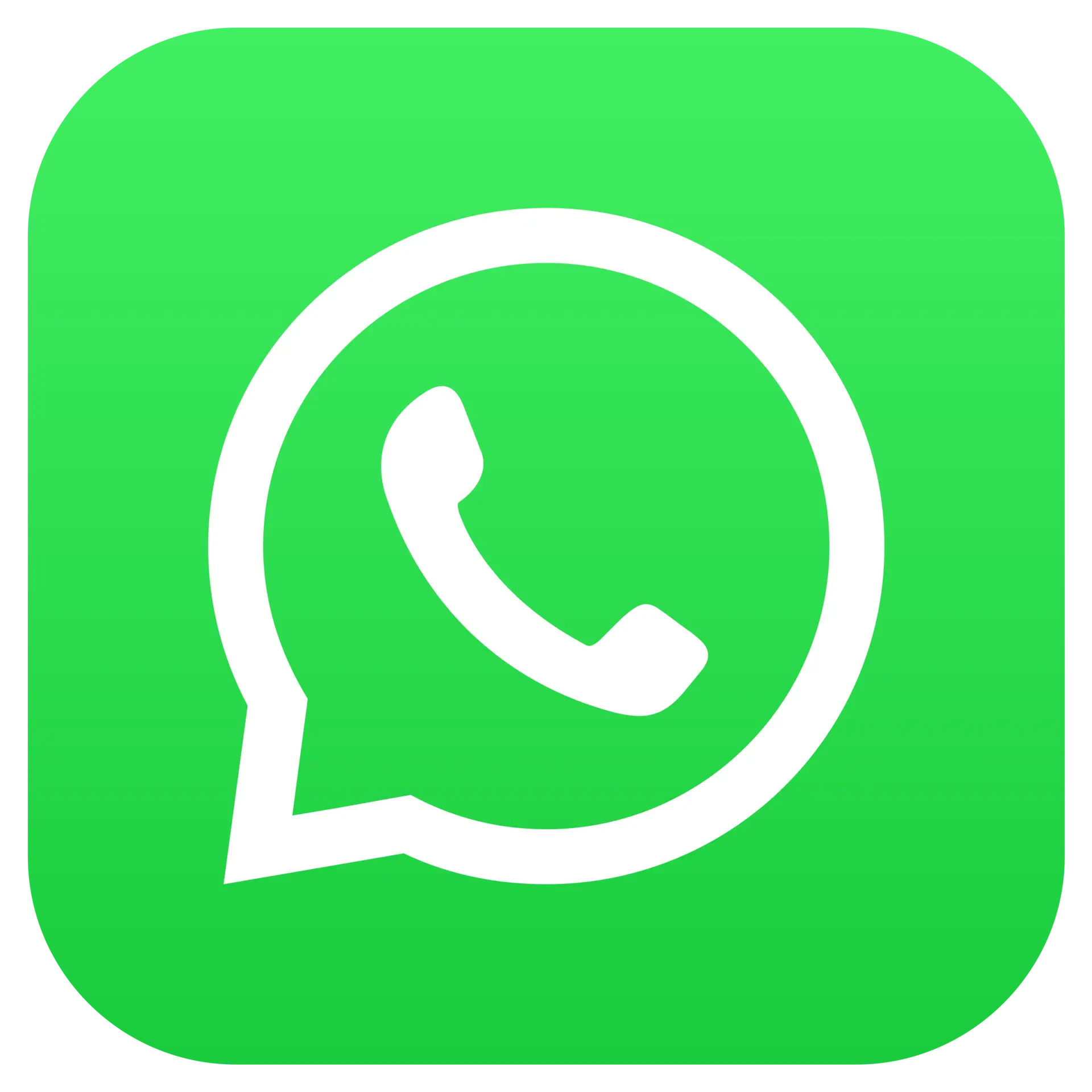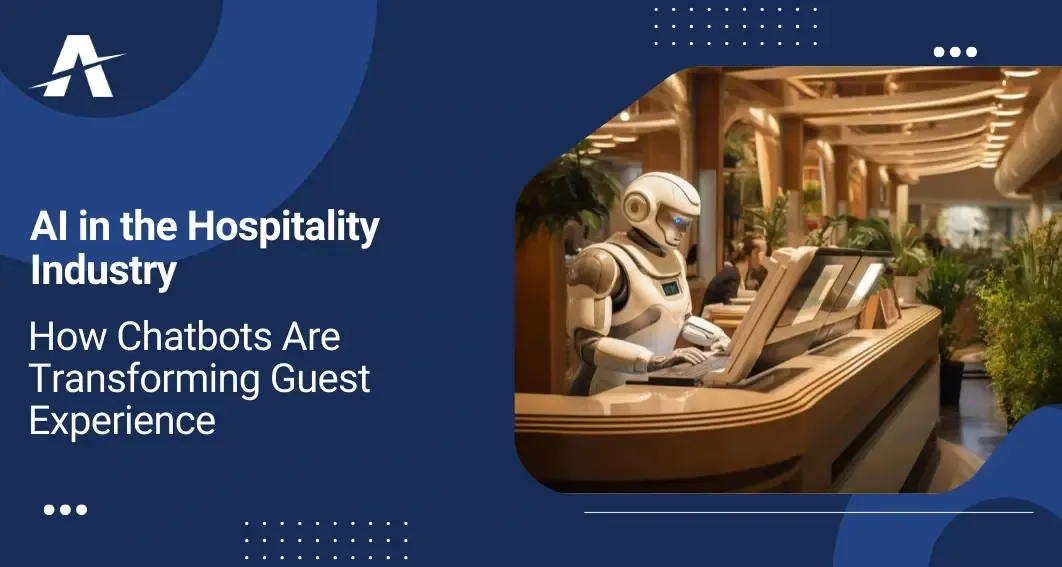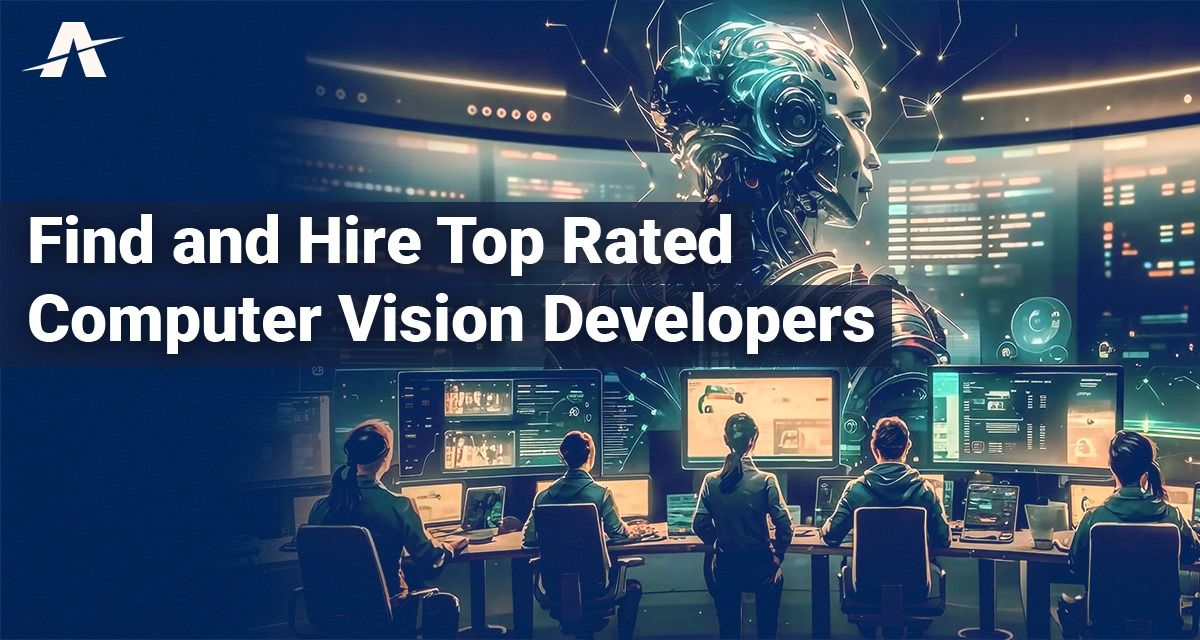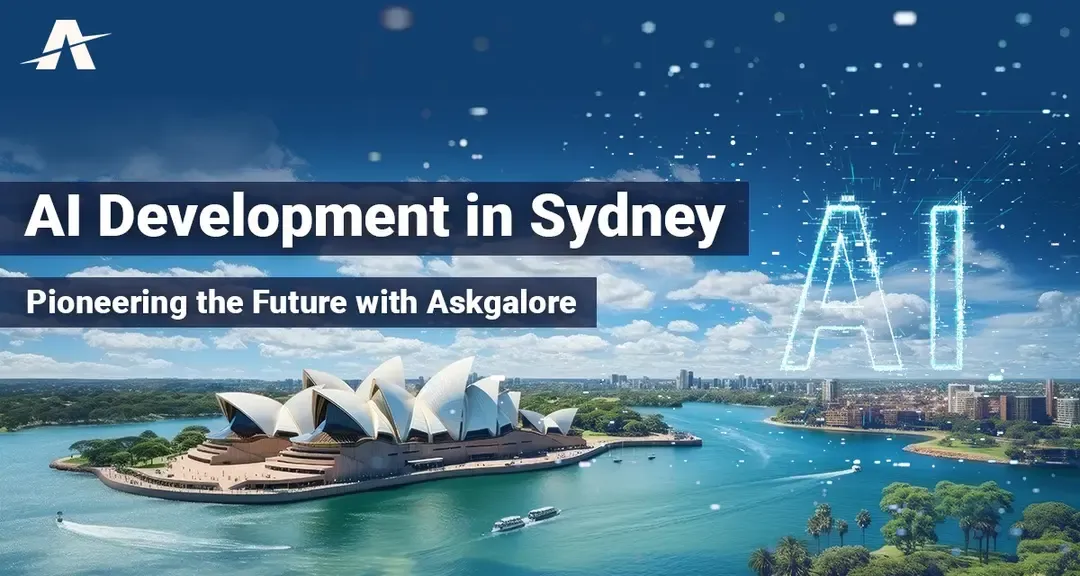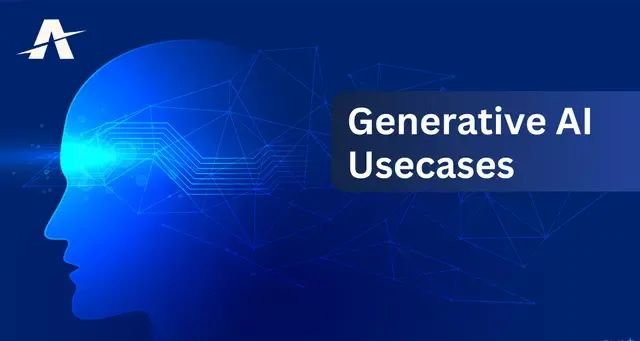
Imagine checking into a hotel without waiting in long lines or getting room service recommendations instantly through a simple chat. AI in hospitality industry is making this a reality. With chatbots handling everything from booking confirmations to guest inquiries, hotels can provide a smoother, faster, and more personalized service.
But are hotels fully utilizing the power of AI chatbots? In this blog, we will have a look at the different types of chatbots in hospitality, their impact on guest experiences, and how hotels can successfully integrate them into their operations. The blog will act as your ultimate guide for AI in the hotel industry.
What is AI in the hospitality industry?
Artificial intelligence in the hospitality industry refers to the use of artificial intelligence technologies to automate tasks, improve customer interactions, and manage hotel operations. AI can analyze guest preferences, predict demand, personalize recommendations, and streamline the booking process. Chatbots in hospitality are among the most widely used, enabling hotels to provide 24/7 customer service and enhance the guest experience.
Key Applications of AI in the Hotel Industry:
| Application | AI in Hospitality Industry Use Case |
|---|---|
| Chatbots & Virtual Assistants | Provide instant customer support and automate booking processes. |
| Personalized Recommendations | AI in the hospitality industry analyzes guest preferences to suggest relevant offers. |
| Dynamic Pricing & Revenue Management | AI optimizes room rates based on demand trends. |
| Automated Check-ins & Check-outs | Reduce waiting times and improve convenience. |
| Housekeeping & Maintenance Scheduling | AI predicts when rooms need cleaning or maintenance. |
| Customer Sentiment Analysis | AI monitors guest feedback and online reviews for service improvements. |
What Are Chatbots in AI in Hospitality Industry?
Chatbots in the hospitality industry are AI-powered virtual assistants that communicate with guests via text or voice to assist with inquiries, reservations, and customer support. In AI in hospitality industry, these are conversational AI chatbots that can understand and respond to customer queries and questions quickly and efficiently.
Different Types of Chatbots in the Hospitality Industry
There are different types of chatbots in hospitality industry that serve various functions. Some common types of chatbots in AI in hospitality industry are:
Rule-Based Chatbots:
These bots follow predefined scripts and respond to specific keywords.
AI-Powered Chatbots:
These bots use Natural Language Processing (NLP) and Machine Learning (ML) to understand guest inquiries and improve over time.
Voice-Enabled Chatbots:
Integrated with voice assistants like Alexa or Google Assistant, allowing guests to make requests using voice commands.
Hybrid Chatbots:
A mix of rule-based and AI-powered chatbots that offer automated responses with human support when necessary.
Use case of Chatbots in AI in Hospitality Industry
To understand how AI chatbots work,? It is important to know aboutGen AI in hospitality industry.
AI chatbots for hotels rely on Natural Language Understanding (NLU)and Machine Learning (ML) to interpret guest messages and provide accurate responses.
Step 1: A guest asks a question via chat or voice.
Step 2: The chatbot processes the query using NLP.
Step 3: The chatbot searches its database for the most relevant response.
Step 4: The chatbot responds instantly, or, if needed, redirects the query to a human agent.
How Guests Interact with Hotel Chatbots
In AI in hospitality industry, hotel chatbots are integrated into various platforms, making it easy for guests to interact with them at different stages of their journey.
Common Guest Interactions with Hotel Chatbots
| Interaction | Example Use Cases |
|---|---|
| Pre-Booking Assistance | Guests inquire about hotel amenities, room types, and availability. |
| Booking & Reservations | The AI chatbot for customer service helps guests book rooms, upgrade packages, and modify reservations. |
| Check-In & Check-Out | Chatbots for hotels provide digital check-in options, keyless entry, and express check-out services. |
| Room Service Requests | Guests order food, housekeeping, or additional amenities via chatbots for hotels. |
| Travel & Local Recommendations | AI chatbots for businesses provide suggestions for nearby attractions, restaurants, and events. |
| Customer Support | AI chatbots for customer service handle FAQs, complaints, and emergency assistance. |
Example: AI in hospitality industry with a chatbot can assist a guest in finding available rooms, suggest a package deal, and complete the reservation—all with automation.
How Common Are Chatbots in Hospitality?
The use of AI chatbots in hospitality is rapidly growing. According to industry reports:
During a 2022 survey, almost 50 percent of respondents said that they were somewhat interested in staying at a hotel that uses automated messaging or a chatbot to provide support for most customer service requests (through a mobile device, kiosks, etc.).
Meanwhile, a Statista survey in collaboration with Booking.com showed that in Europe, 11 percent of accommodation businesses already used AI as of late 2023.
80% of customer interactions will be handled by AI-powered chatbots in the near future.
A luxury hotel that introduced AI voice assistants in its rooms reported a 30% reduction in routine service calls to the front desk, freeing up staff for more complex guest interactions. Additionally, guest satisfaction scores for room features and overall experience increased by 20%.
How to Implement an AI Chatbot on a Hotel Website?
Integrating an AI chatbot into a hotel website requires careful planning to ensure it aligns with guest needs and business goals.
Steps to Implement an AI Chatbot:
Define the chatbot’s purpose: Decide whether the chatbot will handle reservations, customer support, or general inquiries.
Choose the Right AI Chatbot Platform: Select a chatbot provider that specializes in AI in hospitality industry and offers NLP capabilities and integration with hotel systems.
Train the Chatbot with Relevant Data: Provide FAQs, hotel policies, and previous customer interactions to improve chatbot responses.
Integrate the chatbot into your website & booking engine: AI chatbots online ensure seamless communication between the chatbot and the reservation system.
Test & Optimize the Chatbot: Conduct real-world testing and refine responses based on customer interactions.
Monitor Performance & Improve: Use analytics to track chatbot effectiveness and update its knowledge base regularly.
Best AI in Hospitality Industry
Several top AI chatbot solutions cater to the hotel industry. Some chatbots in hospitality examples are:
HiJiffy
AI-powered chatbot for hotels that enhances guest communication.
Asksuite
Multi-channel chatbot specializing in hotel reservations.
IBM Watson Assistant
Offers chatbots in AI for hospitality businesses.
Zendesk Chat
A flexible chatbot in hotel industry, with integration for hotel websites.
Final Thoughts
AI chatbots are changing AI in hospitality industry by providing round-the-clock customer service, improving efficiency, and increasing guest satisfaction. As hotels continue to embrace AI technology, chatbots will become an essential tool for managing guest interactions and optimizing hotel operations.
By implementing AI chatbots effectively, hotels can streamline bookings, enhance customer experiences, and stay ahead of industry trends. AI for hospitality sector is booming; now is the time to utilize the AI-powered chatbot solutions for better guest engagement.
(FAQs)
1. How is AI used in hospitality industry?
AI is changing the way the hospitality industry works by enhancing customer service, personalizing guest experiences, and organizing hotel operations. Hotels and resorts use AI in hospitality industry.
Chatbots & Virtual Assistants:
Chatbots for hotels provide 24/7 customer support for bookings, FAQs, and daily operations services.
Personalized Guest Recommendations:
AI analyzes customer preferences to suggest customized experiences.
Automated Check-Ins & Smart Room Controls:
AI-powered kiosks and mobile apps allow self-check-in, while smart rooms adjust lighting and temperature based on guest preferences.
Revenue & Demand Prediction:
AI-driven analytics help hotels optimize pricing and maximize occupancy rates
AI in hospitality industry improves efficiency and guest satisfaction.
2. How can AI and chatbots be used by a five-star hotel?
Five-star hotels use AI and chatbots to deliver luxury-level personalized experiences and operational excellence.
AI-Powered Smart Concierge Services
Virtual assistants like IBM Watson and Google Assistant handle guest requests.
Chatbots for Seamless Communication:
AI chatbots help guests with dining reservations, spa bookings, and event planning.
Predictive Personalization:
AI analyzes guest preferences to customize room settings, amenities, and special offers.
AI-Enhanced Security & Access Control:
Facial recognition and AI-driven keyless entry improve security.
AI in hospitality industry and chatbots help luxury hotels create a flawless, guest-centric experience.
3. Which AI is used in chatbots?
The AI used in chatbots for the hospitality industry is powered by natural language processing (NLP) and machine learning (ML). The most popular AI models include:
Google Dialogflow: Used for conversational AI chatbots.
IBM Watson Assistant: Provides context-aware, personalized chatbot responses
Amazon Lex powers: voice-enabled chatbots and integrates with Alexa.
GPT-based AI Models (OpenAI’s ChatGPT): Advanced AI for human-like chatbot interactions.
This technology of AI in hospitality industry allows chatbots to understand guest queries, provide accurate responses, and continuously improve through learning algorithms.
4. What are chatbots and their uses and impact in the hospitality sector?
Chatbots are AI-driven virtual assistants that help hotels and travel businesses enhance customer service. The use of ai in hospitality industry is diverse and dynamic. The impact of AI in hospitality industry includes:
Automating Guest Interactions: Chatbots handle common inquiries, reducing the workload for hotel staff.
Faster & Efficient Bookings: Guests can make instant reservations via chatbot conversations.
Personalized Customer Experience: AI chatbots remember guest preferences, enhancing satisfaction.
Cost Savings for Hotels: Reducing the need for large customer service teams while improving response rates.
Improved Customer Engagement: Chatbots provide real-time recommendations, itinerary planning, and upselling of hotel services.
The impact of chatbots in the hospitality industry is significant, as they boost operational efficiency, enhance guest satisfaction, and improve revenue generation.
About AskGalore
AskGalore is a leading Artificial Intelligence Company and Blockchain consulting service provider specializing in delivering comprehensive AI/ML web3 and custom software development services for startups, SMEs and enterprise clients across the globe. With over 7+ years of experience in the industry, we focus on product engineering and custom software development services especially in the fields of computer vision, AI Chatbot Development Services, generative AI, Natural Language Processing (NLP), Large Language Models (LLMs), Data Engineering and Blockchain services.




